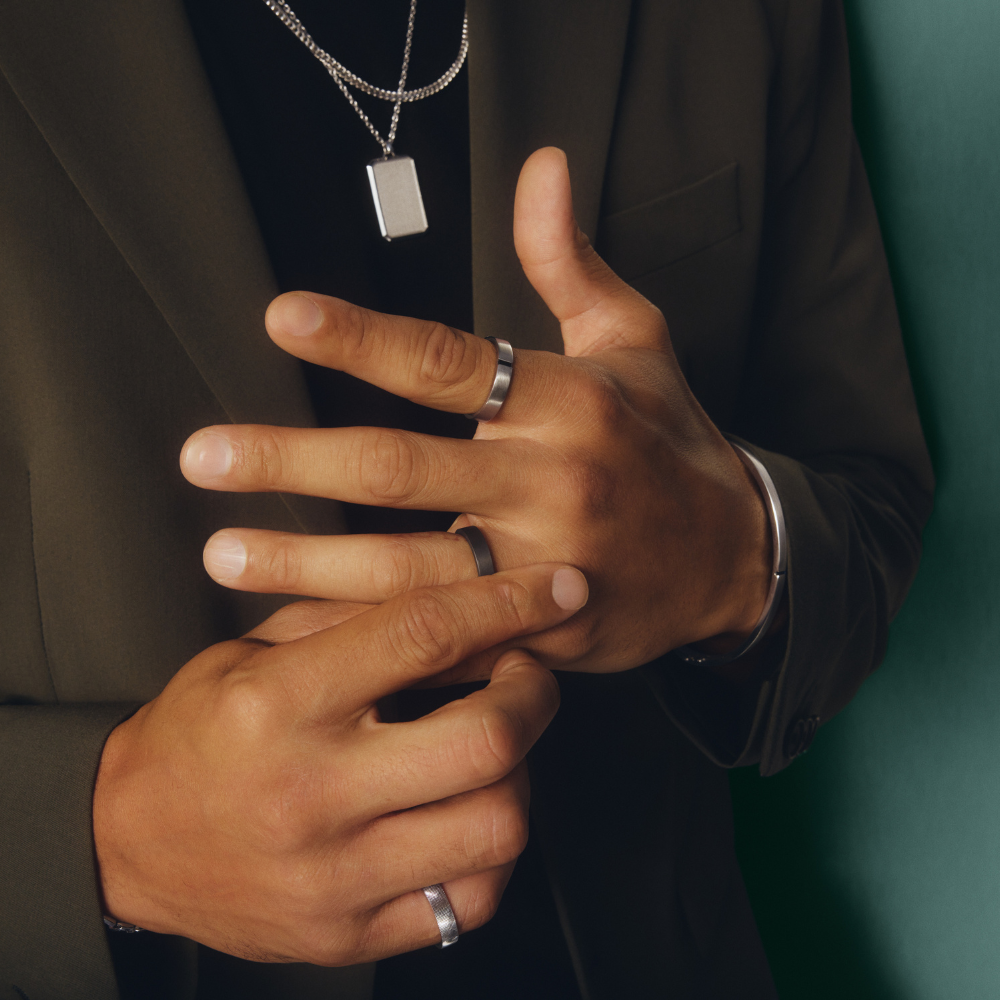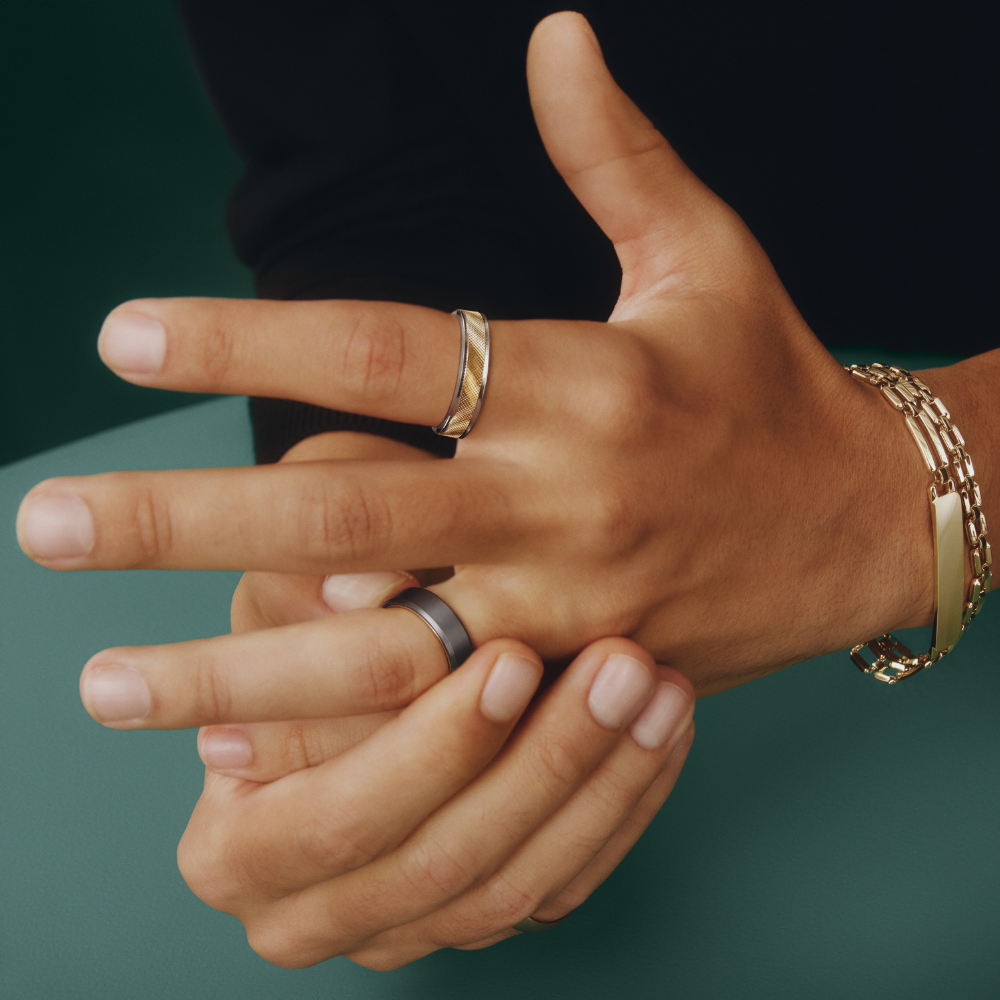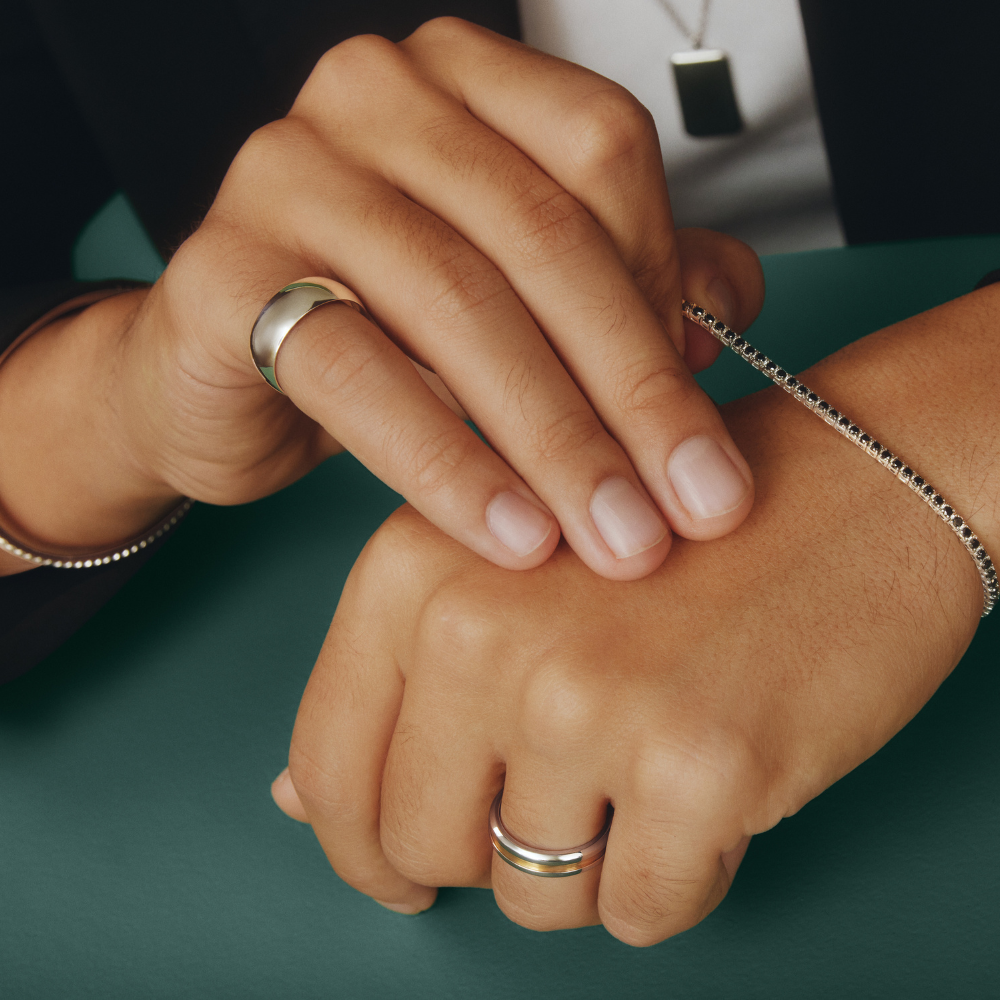Choosing the right metal for a men’s wedding band goes beyond aesthetics—several factors come into play, including durability, hypoallergenic properties, weight, and cost.
- Durability: Metals like platinum and tungsten are incredibly durable and scratch-resistant, making them ideal for those with active lifestyles or hands-on professions.
- Weight: Metals like platinum are heavier, adding a substantial feel, while titanium and forged carbon offer a lightweight, modern alternative.
- Hypoallergenic Properties: Sensitive skin requires hypoallergenic options like platinum, titanium, or tantalum to prevent irritation.
- Budget: Gold and platinum tend to be pricier, while tungsten and titanium can be more affordable without compromising on style.
Below, we outline the most popular options and provide key details to help you make an informed decision.
Yellow Gold
Yellow gold is a timeless classic, cherished for its warm glow and traditional look. Most yellow gold men’s wedding bands are crafted in 14K or 18K, with the former being more durable due to a higher concentration of alloys. This metal is versatile, blending well with both casual and formal attire.
- Durability: Moderate; may scratch and require polishing over time.
- Weight: Moderate with a slightly heavier feel.
- Hypoallergenic: Higher karat options have a lower risk of irritation, though alloys like nickel may irritate sensitive skin.
White Gold
White gold offers a sleek, modern appearance. Its silvery-white tone is achieved by mixing yellow gold with metals like palladium, nickel, or rhodium. White gold is great for those seeking a classic look with a contemporary twist.
- Durability: Good; needs rhodium plating every few years to maintain brightness.
- Weight: Moderate; comparable to yellow gold.
- Hypoallergenic: May cause reactions; nickel-free alloys are preferable for sensitive skin.
Rose Gold
With a warm, pinkish hue, rose gold has a distinctive, romantic charm. The color results from blending gold with copper, giving it a blush tone that has grown in popularity among modern designs.
- Durability: Moderate; the copper alloy adds some scratch resistance.
- Weight: Moderate; similar to yellow and white gold.
- Hypoallergenic: May cause irritation for sensitive skin types.
Platinum
Platinum is a premium choice for its rarity, durability, and naturally white sheen. Unlike gold which needs alloys to change color, platinum remains pure, making it hypoallergenic and an excellent choice for sensitive skin. Its weight also appeals to those who prefer a solid feel.
- Durability: Excellent; highly scratch-resistant and maintains its patina over time.
- Weight: Heavy, adding a substantial feel to the band.
- Hypoallergenic: Safe for sensitive skin as it’s usually free from irritating alloys.
Tungsten
Tungsten is one of the hardest metals available and is resistant to scratches and tarnish, making it ideal for a busy lifestyle. Its dark gray hue gives it a unique and masculine look. However, tungsten rings are not resizable due to their rigidity, which may be a consideration over time.
- Durability: Extremely high; resistant to scratching and tarnishing.
- Weight: Heavy, offering a robust, substantial feel.
- Hypoallergenic: Generally safe; usually contains no nickel, making it suitable for sensitive skin.
Titanium
Titanium is valued for its strength-to-weight ratio, offering remarkable durability without the heavy feel. Available in both polished and matte finishes, titanium is a popular choice for those wanting a modern, minimalist style.
- Durability: High; resistant to bending, scratching, and corrosion.
- Weight: Very light, offering a comfortable fit for everyday wear.
- Hypoallergenic: Ideal for sensitive skin.
Meteorite
Meteorite rings stand out for their one-of-a-kind texture and unique origin. Crafted from fragments of meteorites, these rings often display a distinct pattern, giving each ring a unique appearance. They are typically set in combination with other metals for added durability.
- Durability: High, but susceptible to rust without proper care.
- Weight: Moderate to heavy, depending on the metal pairing.
- Hypoallergenic: Generally safe but may vary based on composition.
Tantalum
Tantalum offers a modern aesthetic with a dark, bluish-gray color. Known for its durability, this metal is resistant to scratches and can be polished to restore its luster. Tantalum’s hypoallergenic properties make it an excellent choice for sensitive skin.
- Durability: High; excellent scratch resistance and easy to polish.
- Weight: Moderate, offering a comfortable yet solid feel.
- Hypoallergenic: Highly suitable for those with skin sensitivities.
Forged Carbon
Forged carbon is a relatively new option, offering a contemporary, lightweight feel with a unique marbled pattern. It’s highly durable and scratch resistant, making it ideal for those seeking an unconventional and modern style.
- Durability: Excellent; highly scratch-resistant.
- Weight: Very light, making it exceptionally comfortable.
- Hypoallergenic: Generally hypoallergenic and suitable for sensitive skin.
Zirconium
Zirconium offers an edgy look with its blackened finish, created by heating and oxidizing the metal’s surface. Zirconium is strong and durable, making it ideal for those seeking an alternative, non-traditional style.
- Durability: High; very resistant to scratches and corrosion.
- Weight: Moderate, providing a balanced feel.
- Hypoallergenic: Safe for sensitive skin.
What Is the Best Metal for Men’s Wedding Bands?
The best metal for a men’s wedding band ultimately depends on individual needs and preferences. For timeless elegance and durability, platinum and yellow gold remain top choices. Titanium and tungsten provide durability with a modern, minimalistic edge, while forged carbon and meteorite offer distinctive styles for those seeking something unique.
Still interested in learning more about birthstones? Check out our other Wedding Band Guides: Platinum vs. Gold, How Much Should a Wedding Ring Cost?, Women’s Wedding Ring Styles, Men’s Wedding Band Styles, Ring Engraving Guide, Wedding Ring Trends, What Hand Does a Wedding Ring Go On?










